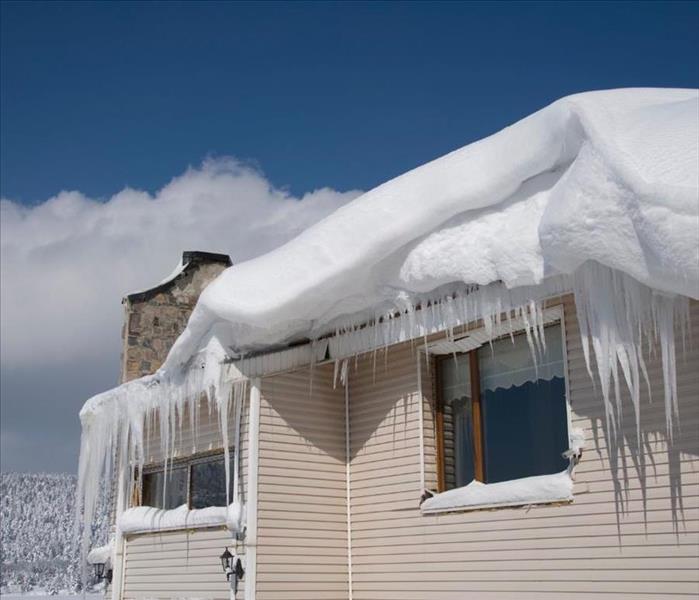Tips for Weatherproofing Your PNW Home
11/22/2022 (Permalink)
As the temperature drops, the susceptibility of our most significant assets increases. Weatherproofing your home can save thousands of dollars on heating and repair costs and make the winter more comfortable. Here are fifteen tips for weatherproofing your home this winter.
- Check for drafts around windows, doors, and fireplaces and address them. The last thing you want when you are trying to keep your home toasty and warm is a draft letting in cold air. Apply caulk around windows to seal them against the cold. Consider applying weather stripping around doors and windows.
- Install storm doors. Consider installing a storm door if you want a double layer of protection against drafts. Not only do storm doors protect your home against drafts, but they also prevent moisture from reaching your door frame. Plus, storm doors allow the sun to warm your home a bit on sunny days and create a nice sunny spot for the family dog to rest. Tell your dog we said you're welcome.
- Add a door sweep. Consider installing a door sweep if there is a gap between the bottom of your door and the threshold. You can easily install a door sweep, which will fill the gap at the base of your door, locking out the cold.
- Insulate your attic. Nearly 40% of the heat in your home is lost through the attic. Think about it. Hot air rises, and your attic is the highest place in your home. If your attic isn’t properly insulated, all that hot air will escape. Attic insulation is a necessity in the PNW. Generally speaking, insulation should be replaced every 15 to 20 years. However, this can vary depending on the type of insulation used. The safest bet is to get an inspection now, so you have time to install insulation if needed.
- Winterize your plumbing system. Water damage is the most common call we get from homeowners. Take the time to winterize your plumbing system properly so freezing temperatures don’t wreak havoc on your home.
- Blow out your sprinkler system. If you haven’t already, blow out your sprinkler system to ensure lines do not crack. You may not realize the damage until the summer when your yard turns into a lake and your water bill skyrockets.
- Insulate any exposed pipes in your walls or crawlspace with foam sleeves.
- Turn off your outdoor faucet and cover it with an insulated faucet cover.
- Disconnect, drain, and store your garden hoses in your garage.
- Close foundation vents. Go around your home and close your foundation vents. Place foam insulation plugs in each vent to prevent cold air and moisture from entering the living spaces in your home.
- Get your roof inspected. If you’ve lived in Bend through the 2017 Snowpocalypse, you can appreciate the importance of a sound roof. Get your roof inspected to ensure your roof doesn’t have any loose or damaged flashing and that your shingles have not deteriorated. Many local roofing companies provide free roof inspections. We are happy to provide a recommendation or two if needed.
- Clean and check your gutters. Clean leaves and other debris from your gutters to prevent them from getting clogged, which can lead to water damage in your home.
- Keep the heat on in your home - even when you aren’t there. Even if you’re going on vacation or only live in your PNW home part-time, the heat should remain on throughout the winter. Keep your thermostat set at 55 degrees to avoid frozen pipes.
- Allow the faucets to drip. When temperatures drop below 20 degrees, let the faucets drip or run in a slow stream to prevent frozen pipes.
- Get your HVAC inspected. Don’t be without heat on the coldest day of the winter. Most local HVAC companies provide plans to inspect and service HVAC units to prevent getting left in the cold. And if you have a gas fireplace, they can inspect and service that too.
- Trim overhanging branches. Branches that overhang your roof can cause a lot of damage during a storm. Trim any overhanging branches and cut back dead limbs to keep your roof better protected.
- Replace your air filters. You should replace your furnace or central air filters every three months so they can run efficiently.
- Replace batteries in your smoke and carbon monoxide detectors every six months. The best way to remember is to change them during daylight savings time.
- Install roof heat tape. Ice dams cause leaks when melting snow hits a dam of ice. Heat tape, also known as heat cables, creates channels that allow the water to escape from your roof.
Your home is your biggest investment. That’s why we highly recommend annual inspections and servicing to identify issues before they become a costly problems. Taking the time to weatherproof your home will help ensure you and your family stay warm and safe throughout the winter season. And if disaster strikes, SERVPRO of Bend is ready to help, 24 hours a day and seven days a week.

 24/7 Emergency Service
24/7 Emergency Service
